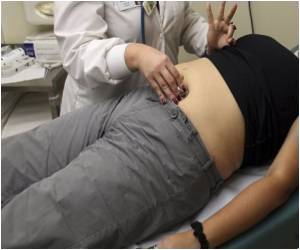
“There was some criticism within the obstetric community that fetal heart rate monitoring was quickly accepted technology without proof that it was effective,” said Suneet P. Chauhan, M.D., one of the study’s authors. “We thought we could use data from the National Birth Cohort to get a large enough sample to gauge its effectiveness.”
Chauhan and his colleagues (Han-Yang Chen, Cande Ananth, Anthony Vintzileos and Alfred Abuhamad) used a sample of 1,945,789 singleton infant birth and death records from the 2004 National Birth Cohort. Multivariable log-binomial regression models were fitted to estimate risk ratio to evaluate the association between electronic fetal heart rate monitoring (EFM) and mortality, while adjusting for age, race, marital status, education, smoking, and the infant’s gender.
The results showed that in 2004, 89% of singleton pregnancies had EFM. EFM was associated with significantly lower infant mortality (adjusted RR 0.75; 95% CI 0.69, 0.81); this was mainly driven by the lower risk of early neonatal mortality (adjusted RR 0.50; 95% CI 0.44, 0.57) associated with EFM. In low-risk pregnancies, EFM was associated with decreased risk for low (< 4) 5 min Apgar scores (RR 0.54; 95% CI 0.49, 0.51), whereas in high risk pregnancies EFM was also associated with decreased risk of neonatal seizures (adjusted RR 0.65; 95% CI 0.46, 0.94).
The study demonstrates that the use of EFM decreased early neonatal mortality by 53%.
The Society for Maternal-Fetal Medicine (est. 1977) is a non-profit membership group for obstetricians/gynecologists who have additional formal education and training in maternal-fetal medicine. The society is devoted to reducing high-risk pregnancy complications by providing continuing education to its 2,000 members on the latest pregnancy assessment and treatment methods. It also serves as an advocate for improving public policy, and expanding research funding and opportunities for maternal-fetal medicine.
Advertisement
Source-Medindia













